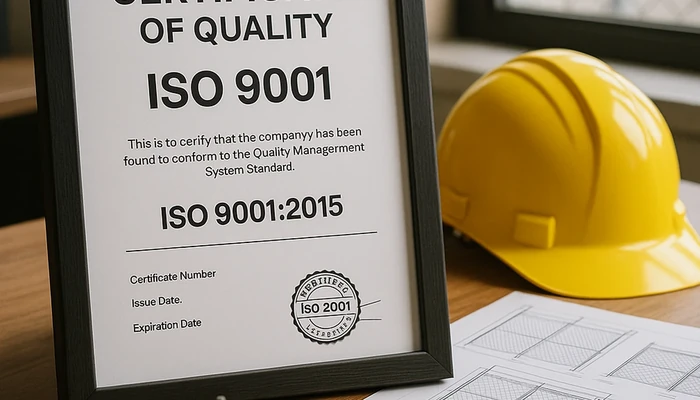Certifications That an Industrial Fence Company Must Have
Choosing an industrial fence company goes far beyond just comparing prices or design options. If you are a homeowner, property manager, or general contractor in Chicago or the suburbs, understanding which certifications an industrial fence company should hold is crucial. Proper certifications ensure not just code compliance but also long-term safety, durability, and suitability for specific needs, such as pet safety or winter weather resilience.
Why Certifications Matter for Industrial Fencing
Certified companies follow industry best practices, adhere to state and city safety requirements, and understand how to install fencing that withstands Chicago’s severe winters and dramatic freeze–thaw cycles. Compliance with standards like ASTM F552 and rules set by the Occupational Safety and Health Administration (OSHA) proves reliability and credibility.
Key Certifications for Fence Installers
Before signing a contract, always verify a company’s credentials. Here are the most important certifications to seek out:
| Certification | Description | Why It’s Important |
|---|---|---|
| City of Chicago General Contractor | Required for all fence installations in city limits | Legal compliance & ability to pull permits |
| ASTM Membership | Membership in American Society for Testing and Materials | Ensures product/materials meet national specs |
| OSHA 10/30 Training | Worker safety certification | Reduces risk of onsite injury; ensures site safety |
| Manufacturer Certifications | Training from major suppliers (e.g., Ameristar, Master Halco) | Ensures accurate, warranted installations |
| EPA Lead-Safe Certification | Required when working around older painted surfaces | Protects residents, pets, and crews from exposure |
| ICPI Installer (for gate foundations/pavers) | Interlocking Concrete Pavement Institute | Proper base installation, especially for automated gates |
How Certifications Impact Fence Performance
- Winter Care: Trained crews use installation methods that resist Chicago’s freezing and thawing cycles, reducing fence heaving and damage.
- Pet Safety: Certified companies understand ASTM F2454 for pet enclosures, selecting appropriate mesh and height.
- Cost: Choosing a certified installer often lowers long-term repair and maintenance bills by preventing premature failure.
- Design Flexibility: Manufacturer certifications allow more options for material/color, including custom vinyl or ornamental styles.
Step-by-Step: Verifying Fence Company Certifications
- Request Documentation: Ask for copies of all relevant certificates, such as General Contractor licenses and OSHA cards.
- Check Expiry Dates: Ensure certifications (especially safety training) are current and valid for Chicago and its suburbs.
- Cross-Check Online: Use official resources like the City of Chicago Department of Buildings and the EPA Lead Program to verify records.
- Confirm Insurance: Reputable companies carry at least $1M liability and work comp insurance, usually tied to their certifications.
Frequently Asked Questions About Fence Company Certifications
Can I hire an out-of-state fence company?
Only if they are licensed in Illinois and familiar with Chicago code. Inspections may be stricter in the city than in surrounding suburbs.
What happens if my installer isn’t certified?
Your project can face permit delays, mandatory tear-outs, or liability issues in case of injury. Insurance claims may be denied.
Do certifications vary by fence material?
Yes. For example, some styles like vinyl or ornamental iron require additional manufacturer training to maintain warranties. We recommend seeing our insights on industrial fencing materials for more details.
Keeping Up With Recent Innovations
If you’re interested in how standards and certifications influence fence trends and maintenance, explore our articles on the latest fence design trends or emerging technologies in industrial fence maintenance.
Summary Table: Quick Certification Checklist for Chicago Projects
| Cert Needed | Applies To | Where to Check |
|---|---|---|
| Chicago GC License | All commercial/industrial fencing | City of Chicago |
| OSHA 10/30 | Field staff | OSHA.gov |
| ASTM Specs | Material & install | ASTM.org |
| Manufacturer Card | Specific materials | Supplier |
When to Call in the Pros
Always confirm your installer meets all legal and manufacturer requirements—especially during winter months or for projects involving pets and children. Professional installers will supply documentation proactively. For fully certified installations and peace of mind, contact our experts about a vinyl fence of Chicago or learn about different material options.
For broader industry context, see how fence certifications impact corporate image.
Conclusion
Verified certifications are more than mere paperwork—they’re your assurance of a safe, lasting, code-compliant installation that handles Chicago’s winter extremes, protects pets, and adds property value. Whether managing a large facility or protecting your residential investment, always check that your chosen company is up-to-date and certified in every way that matters.
About the Author: Reviewed by: CHICAGO COMMERCIAL FENCING Editorial Team — With over 25 years of experience in commercial and industrial fence installation throughout Chicago and the surrounding suburbs, our team brings authoritative, local expertise to every post. We are passionate about safety, code compliance, and innovative design solutions.

Commercial Fence Company Chicago, Commercial Fence Company Chicago IL, Chicago Commercial Fence Company, industrial fence Schaumburg, industrial best fences of Franklin Park il, industrial fencing Addison IL, industrial best fences near Elgin il, industrial fence permit of Evanston, industrial fences in Melrose Park il, industrial fence in Bensenville IL
